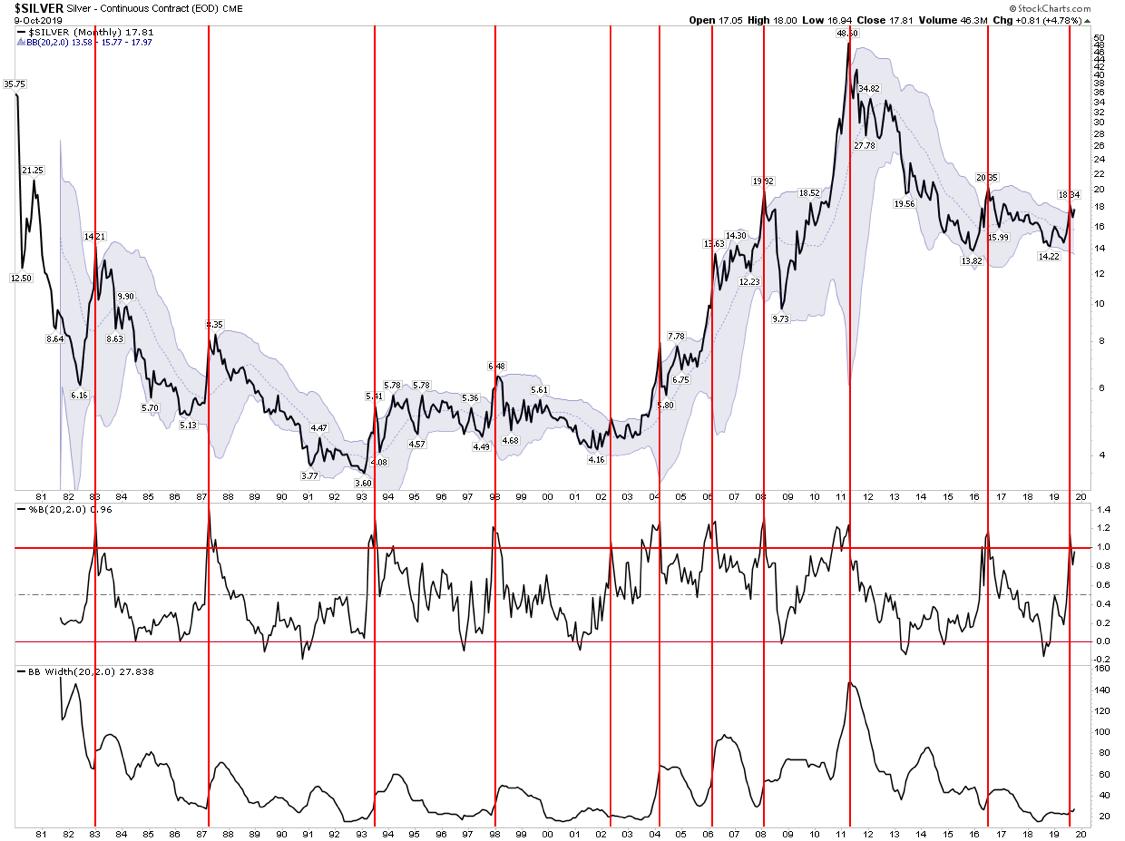I don't trade silver too often, but I do watch it as it is an important component of the precious metal complex.
One thing I've noticed is that when silver gets outside of the Bollinger Bands on a monthly chart - especially when it is above the upper band - a correction occurs. There isn't any "tell" as to how big the correction will be or how long it will last, but, for me, there is a warning to be careful. The chart below is a monthly chart (courtesy of StockCharts.com, 10/9/19) starting in 1980; you can judge for yourself whether trading above the upper Bollinger Band is meaningful.

Questions and comments are always welcome: ttaschler@sprottglobal.com.
Tim Taschler, CMT
Sprott USA
Past performance does not guarantee future results. The views and opinions expressed herein are those of the author's as of the date of this commentary and are subject to change without notice. This information is for information purposes only and is not intended to be an offer or solicitation for the sale of any financial product or service nor a recommendation or determination by Sprott Global Resource Investments Ltd. that any investment strategy is suitable for a specific investor. Investors should seek financial advice regarding the suitability of any investment strategy based on the objectives of the investor, financial situation, investment horizon and their particular needs. This information is not intended to provide financial, tax, legal, accounting or other professional advice, since such advice always requires consideration of individual circumstances. The products discussed herein are not insured by the FDIC or any other governmental agency, are subject to risks, including a possible loss of the principal amount invested.
Generally, natural resources investments are more volatile on a daily basis and have higher headline risk than other sectors, as they tend to be more sensitive to economic data, political and regulatory events as well as underlying commodity prices. Natural resource investments are influenced by the price of underlying commodities like oil, gas, metals, coal, etc., several of which trade on various exchanges and have price fluctuations based on short-term dynamics partly driven by demand/supply and also by investment flows. Natural resource investments tend to react more sensitively to global events and economic data than other sectors, whether it is a natural disaster like an earthquake, political upheaval in the Middle East or release of employment data in the U.S.. Low-priced securities can be very risky and may result in the loss of part or all of your investment. Because of significant volatility, large dealer spreads and very limited market liquidity, typically you will not be able to sell a low priced security immediately back to the dealer at the same price it sold the stock to you. In some cases, the stock may fall quickly in value. Investing in foreign markets may entail greater risks than those normally associated with domestic markets, such as political, currency, economic and market risks. You should carefully consider whether trading in low-priced and international securities is suitable for you in light of your circumstances and financial resources. Past performance is no guarantee of future returns. Sprott Global, entities that it controls, family, friends, employees, associates and others may hold positions in the securities it recommends to clients and may sell the same at any time. The author received no compensation for writing this article.
